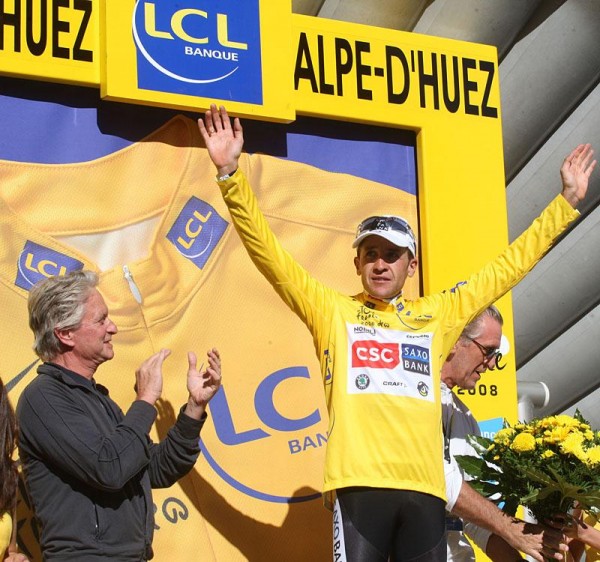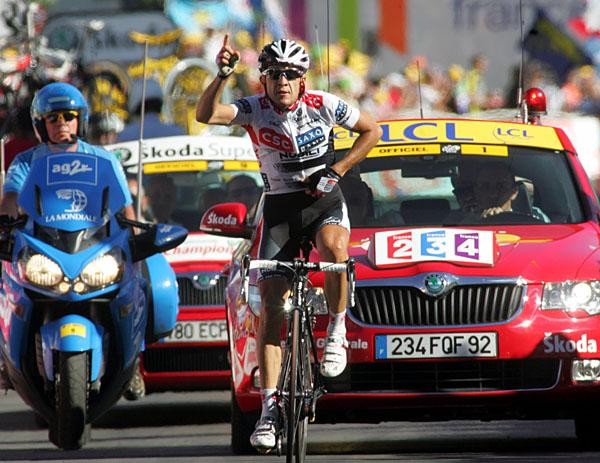Carlos Sastre: Living in the moment
It's been a long time coming, but Spaniard Carlos Sastre has finally lived up to his promise as a...


Tour de France News feature, July 24, 2008
It's been a long time coming, but Spaniard Carlos Sastre has finally lived up to his promise as a Grand Tour contender and taken the yellow jersey in the Tour de France. His attack at the base of the Alpe d'Huez recalled his only other Tour stage win, which came in 2003 on the Plateau de Bonascre. This year's victory salute was more befitting of a team leader, and rather than put his baby's pacifier in his mouth, Sastre instead pumped his fist in the air in an uncharacteristically aggressive gesture.
The Spaniard's aggression was entirely necessary, as he will need every second he gained on Wednesday's stage if he wants to keep his lead through the time trial on Saturday. It has been Sastre's relatively weak time trial performances which have kept him off of the top of the Grand Tour podiums.
In 2006, he was only 12 seconds from yellow before the final time trial, but said goodbye to any hope winning the Tour in the 57 kilometre final time trial, by losing more than two minutes to eventual winner Oscar Pereiro. He would go on to take the final podium spot, but only after Floyd Landis was disqualified for doping.
Sastre put an important 2'15" into Australian Cadel Evans with his ride up Alpe d'Huez, but it was his CSC-Saxo Bank squad which set the stage for his performance with admittedly predictable but effective tactics. "I guess it's no secret, but we will be implementing a similar plan to what we have done on each mountain stage so far. It is not really rocket science. We have the strongest team and we have to use our strengths," said directeur sportif Scott Sunderland before the Alps.
Just as they have done since the Pyrénées, the Danish team led the peloton over the Col du Galibier and the Col de la Croix de Fer in the 210.5-kilometre day, and then surged into the base of the 13.8-kilometre Alpe d'Huez with six men and Fränk Schleck's seven-second lead in the overall well protected. Following the last surge by CSC's Fabian Cancellara, Sastre played the perfect tactical card and launched at the base of the climb – the favourites did not see him again.
"I decided to attack from the start because everyone was tired from the CSC efforts on the Col de la Croix de Fer. I took off from the start to get as much time as possible," said Sastre. "I knew I could do better at my own pace instead of constant attacks. It was better early – I could also surprise them by going as early as possible."
Get The Leadout Newsletter
The latest race content, interviews, features, reviews and expert buying guides, direct to your inbox!
Heading into the day 41 seconds down on rival Cadel Evans, Sastre knew he could not go into the final time trial on Saturday at a deficit, and indeed would need several minutes on Evans to keep his dreams of winning the Tour alive.
Despite being weaker against the clock than the likes of Evans and Rabobank's Denis Menchov, Sastre placed the best in the stage four time trial in Cholet of the CSC-Saxo Bank leaders, clearly demonstrating that he's been working on his skills against the clock.
Yet pundits criticized CSC for not creating more pressure earlier on in the day, with most believing the team would need to attack early to gain time on Evans. However, the race was status quo over the first two hors catégorie climbs and left CSC little space for time gains up the Alpe d'Huez.
"There was a lot of wind on the Col du Galibier so we decided to wait on the Col de la Croix de Fer," Sastre explained. "We needed to keep Andy [Schleck] there and for the Alpe d'Huez. We need to create as much time as possible on Menchov and Evans."
Sastre formulated a plan with his team-mates over the 30 kilometres down from Col de la Croix de Fer. He talked to Fränk Schleck as the two prepared for the Tour's last high-mountain climb.
"It was my thought to attack at the base of the Alpe d'Huez, and to go before the [others'] attacks. Fränk said to have a go. Without the help of my team-mates I would not have done it. The Schleck brothers sacrificed themselves, and that is the philosophy of the team."
Sastre should have no problem in maintaining the race leadership through Thursday's stage to Saint Étienne and Friday's to Montluçon. His biggest challenge will come on Saturday – the 53 kilometre time trial to Saint Amand Montrond. With Evans just 1'34" behind, all of the cycling will be calculating just how close the standings will be on Saturday night.
"I don't want to think about the time trial now, I just want to enjoy the next few days in yellow and then I will start thinking of the time trial," Sastre said after the stage. "I know there are two tough days to come. Over the next days, I will think about how I can protect the lead and then focus and rest for the time trial."
Even team manager Bjarne Riis didn't want to think about what could happen on Saturday. "We did what ever we could today; we can be very proud and happy. If we don't win this Tour we will be proud and happy anyway because I know we did the best we could," Riis said. "We did the maximum and it was an excellent job. Fränk could have attacked more, maybe not leave the rest behind, but he did exactly what he had to do and I think that is great."
Carlos Sastre began his career as a domestique for the ONCE team, in the service of Abraham Olano, Joseba Beloki, and Igor Gonzales de Galdeano. He moved over to Bjarne Riis' CSC team in 2002 in order to have more of a free reign, but his ambitions were put on hold after the team hired Ivan Basso. Sastre's best Tour finish came in 2006 after Basso fell under suspicion in the Operación Puerto scandal and was pulled from the team.
Having already endured the heartbreak of losing a podium spot in the Tour's last race against the clock, it's understandable that the team prefers not to dwell on what might happen, and to focus their thoughts on the goal: winning the Tour. "We have to believe in it and we trust our riders," Riis concluded.